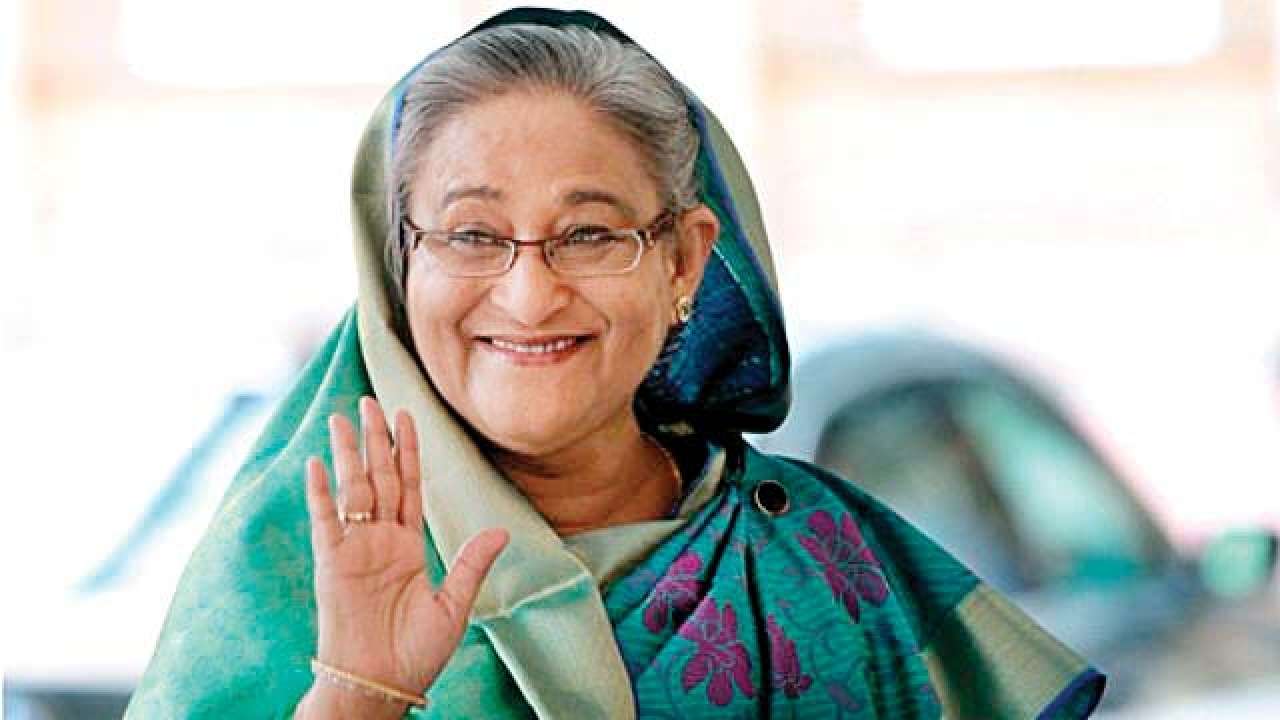
Sheikh Hasina: Gritty stateswoman who steered Bangladesh to prosperity is 75

As Bangladesh Prime Minister Sheikh Hasina Wajed turns 75, the spotlight is firmly on her success in scripting an amazing socially inclusive economic turnaround for Bangladesh, once written off as a ‘basket case’ by American politician Henry Kissinger.
But, Hasina will also be remembered for her role in the restoration of democracy by bringing down a local military regime, like her father had brought the Pakistani military junta – and then in sustaining it against a persisting threat from radical Islamist forces who threaten her regime with violent street agitations, terror strikes and systematic disinformation.
The late Pranab Mukherjee, who Hasina respected as her ‘abhivabak‘ (guardian), once told some journalists, this writer included, during a Sunday adda (hangout session), to imagine what Angela Merkel or Jacinda Arden would have done, if they faced the lurking threat of assassination, having survived many like Hasina.
Also read: What India can learn from Bangladesh’s fight against terrorism
Mukherjee’s take was when it comes to ‘raw courage’, Hasina is comparable to only Indira Gandhi who refused to take off her Sikh bodyguards despite firm intelligence warnings of a lurking physical threat after Operation Bluestar. Maybe we can add Brazil’s Dilma Rousseff, who suffered huge torture in military prisons (hung by her feet and frequently beaten) before reaching the top.
Hasina is deeply religious though her politics is firmly secular. Her spiritual disposition is the source of her courage.
“If Allah desires, I will live and will face all conspiracies to kill me,” she once told a visiting group of foreign journalists who raised the issue of an assassination attempt doing the rounds in local media at that time. “But if Allah does not desire I should live, who am I to question his will,” she added.
Seven years later, as the leader of Opposition, she suffered a deadly attempt on her life on August 21, 2004. The grenade and gunfire left many leaders and party activists dead, but Hasina escaped, as did some of her senior party leaders.
Also read: Bengali confrontationist persona and contemporary realities
For someone who had seen almost her entire family wiped out in a violent coup 29 years ago, it was indeed a tough decision to continue in politics. Much as it was a tough decision to return to Bangladesh seven years after her family was assassinated. Each of these decisions required not just courage, but a determination to uphold and build on her father’s legacy and a deep faith in her destiny.
Born in 1947, Hasina is both a ‘midnight child’ and a ‘daughter of the East.’ An archetypal faithful Bengali housewife with some exposure in student politics, Hasina not only returned to her country at great personal risk, but also re-organised her father’s party, Awami League, before toppling the Ershad military regime. She has ruled Bangladesh for three terms since and is now into the fourth. “All because Allah wishes,” Hasina would argue. But analysts see in her success not only courage and determination, but the presence of a sharp analytical mind which can plan ahead of time and anticipate challenges.
Hasina is a fast learner as well, as her policies on combating climate change would indicate. But what makes her achievement shine is her humility, in stark contrast to leaders who love putting their picture on vaccination certificates and naming stadiums.
From combating the COVID-19 pandemic to maintaining the country’s rising growth curve during the crisis, Hasina’s leadership has been a blessing for Bangladesh. If her father drew global attention to the Bangla language through an UNGA speech in 1974, Hasina was responsible for getting the UNESCO recognition for 21 February as International Languages Day, drawing the spotlight on the seventh largest linguistic group in the world.
If her father wanted a smile on the faces of the poorest, Hasina has been responsible for a huge ‘trickle down’ humanitarian economy that benefits the most vulnerable. And this in a neo liberal era, when the focus is on wealth creation and growth and not so much on distributive justice.
Just before Hasina assumed power for a second time in 2009, the world had begun to talk of Bangladesh as ‘another Afghanistan’. Not only were some Islamist radicals raising such slogans as “Bangla Hobe Taliban” (Bangladesh will follow Taliban), but the systematic Pakistani-style sponsorship of terrorism by the Khaleda Zia’s BNP and Jamaat-e-Islami government was threatening to take Bangladesh down the Pakistani path.
Hasina not only arrested that trend by her firm ‘zero tolerance to terror’, but also enhanced intelligence cooperation with India to thwart a long-term threat to the whole region. Her detractors have blamed Hasina for creating a police state and hauled her up for ‘forced disappearances’ and ‘extra-judicial executions’, but sources close to her argue that she has no choice but to resort to tough policing to keep Islamist radicals at bay.
Also read: India should keep Bangladesh close for fruition of Act East vision
For India, Hasina’s decade in power has been a boon. By pushing out the Northeastern rebels and demolishing their bases that had sprouted under the Zia regime, she addressed India’s security concerns. By allowing transit to the Northeast from the Indian mainland and use of Bangladesh’s ports, Hasina has helped India energise her ‘Act East’ thrust.
Hasina formally recognised India’s role in her country’s freedom by awarding many Indians who helped in 1971 the ‘Muktijuddho Padak’ (Liberation War medal), and also by naming a road in Dhaka after Indira Gandhi. Indian Prime Minister Narendra Modi was the special guest at the Golden Jubilee Celebrations of Bangladesh Independence, and Hasina crushed the radical Islamist violence protesting Modi’s visit.
Hasina turns 75 as Bangladesh turns 50 and India celebrates the 75th anniversary of independence. A happy coincidence, but one that points to something more than that.

